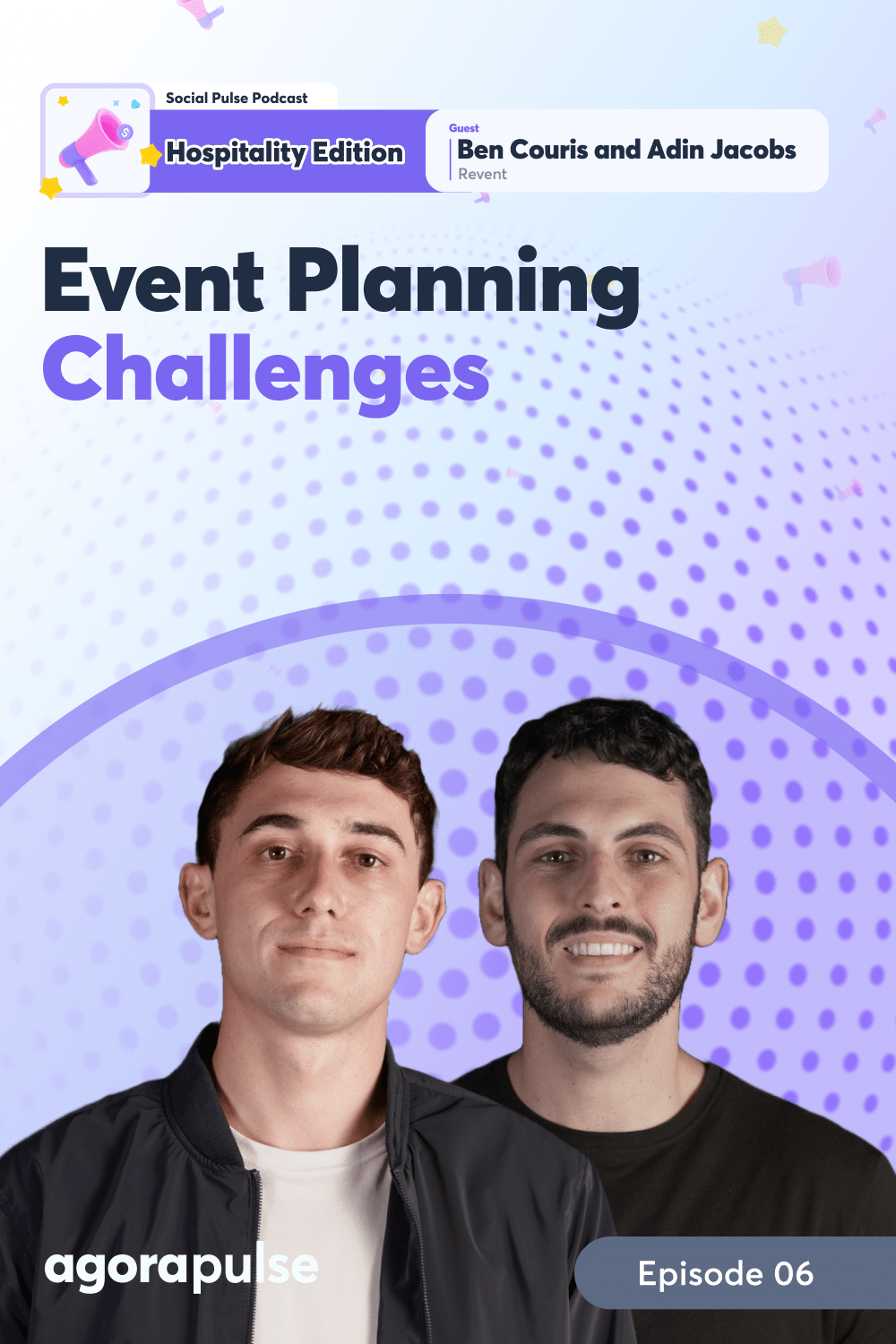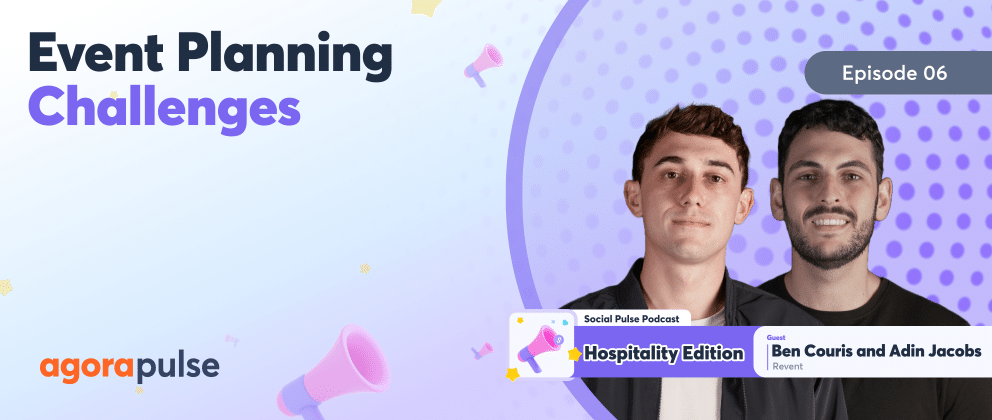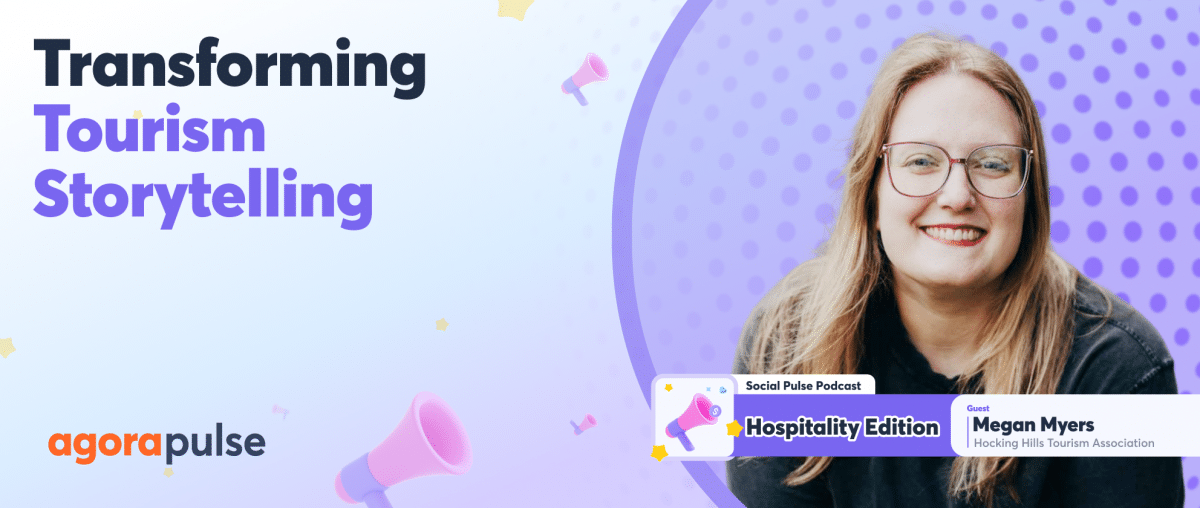Imagine being a marketer asked to plan an event with little to no experience. It’s a common scenario in the hospitality industry where brand marketers and social media pros often find themselves navigating unfamiliar terrain. The pressure is high. The stakes are even higher, and the challenges can seem insurmountable.
How do you ensure everything runs smoothly? How do you engage attendees and create a memorable experience without prior expertise?
Social Pulse Podcast: Hospitality Edition guests today can provide the answers.
Ben Couris and Adin Jacobs, the dynamic duo behind Revent, have revolutionized event planning with their innovative app. As co-founders of Revent, Ben and Adin have conquered numerous challenges in the event planning space, and they’re here to share their insights. They’re going to dive deep into the common hurdles marketers face when tasked with event planning and explore practical strategies to overcome them.
Agorapulse Chief Storyteller Mike Allton, Ben, and Adin also shed some light on how tools like Revent can simplify the planning process, making it easier for marketers to create successful events, even with limited experience.
[Listen to the full episode of the Social Pulse: Hospitality Edition (powered by Agorapulse) below or read on for the transcript highlights.]
Common Marketer Challenges
Mike Allton: I’d love it if you could start by just sharing some of the most common challenges that marketers face when planning events for the first time from your experience.
Ben Couris: We see some of the biggest challenges in budget management, primarily being planning an event that has so many moving parts to it—as well as so many incidental things that come up.
It can get a little crazy to track your budget.
And then the same with task management—when you’re dealing with a team and you’ve been dealing with something like an event that has so many moving parts, things can get forgotten and go unturned and just slip under the radar is primarily what we see with most of the organizers we work with.
Adin Jacobs: Another challenge that a lot of organizers face is logistical coordination. So being able to coordinate your details like transportation, accommodations, and equipment can sometimes be overwhelming, especially for larger events.
Mike Allton: Yeah, that makes a lot of sense. I don’t have in-person event experience, but I’ve been running online events since 2018, and I had to figure it out all on my own. Just juggle lots of spreadsheets and Google Docs and make a whole mess of things. So that’s complicated.
I’d love it if you could explore a little bit about your app and talk to us about how it specifically addresses and helps overcome some of these challenges.
Ben Couris: Yeah, well, exactly to the two points I mentioned—even playing into the point Adin mentioned about logistic coordination—our tool foundationally provides comprehensive budget management features along with task and logistic features.
So through our platform, you can create your budgets and track all your transactions, but then you can also create different logistical and task boards, which you can then assign items to team members and have things come in through approval. Share and save all of your media documents, agreements, and things like that into one system that houses all of that.
Adin Jacobs: Where else we see a solution within Revent is in regards to technology integration, so being able to choose user-friendly platforms and test them thoroughly before the event provides training or support for attendees who may need help with that technology.
Mike Allton: That again sounds like such an amazing thing because again, these are the areas that I’ve struggled with personally, and I know folks listening [or reading!], if they’ve ever been asked to run an online event or an in-person event on behalf of their brand, you’re hitting a lot of those notes.
What are some key strategies that some marketers who have had little to no event planning experience can employ that are going to help them ensure that their events run smoothly?
Ben Couris: From experience before we got into this venture, Adin and I have thrown a decent amount of small events or have been a part of some of that.
And where we see the most success is having a clear plan. I know that sounds a little obvious, but when you’re throwing something together, it can get almost undermined in a way, setting goals, who’s your target audience, your budget timeline, and other key milestones, and outlining that before you get into the thick of the planning process truly makes all of the difference.
Adin Jacobs: I would say the most important thing for myself is building a reliable team: ensuring that you assemble a team with clear roles and responsibilities, even if you have limited experience, and then delegating tasks to capable team members or partners. Overall, ensuring that all aspects of the events are covered.
Can you share some examples of some clients and users and how they’ve used your app to successfully transform their event planning process?
Ben Couris: From a top-level, organization is the key point.
What we have found is that people are used to the software they’re using today. They’re comfortable with them. They trust them. But they’re not connectors—nor are the crucial aspects, like managing your team and tracking your budget integrated within that.
What we’ve been able to provide to organizers that use us is a North Pole per se to your organization to your event planning, keeping everything in one place in one system that feeds off of each of these moving aspects and allows you as the organizer to come into one portal and see, “Okay, this needs to get done for this event. This is what has to be planned and here are all the different moving parts. What do I do and how do I execute them?”
Adin Jacobs: To piggyback off of that, I would say efficiency and providing a centralized solution for all the different touch points within an event organizer’s needs, allowing them to flow seamlessly and smoothly through the event creation process.
How important do you think creativity and adaptability when faced with these kinds of unexpected challenges might be during the planning process of an event?
Ben Couris: I’m glad you asked that. I mean, it almost seems like no matter how buttoned-up you make something when planning an event, there’s going to be something that goes wrong or something that pops up that you just weren’t expecting—and creative thinking when these challenges arise allows planners to devise innovative solutions.
Now this might involve reimagining event elements, coming up with alternative approaches, or turning to a potential setback or turning a potential setback into an opportunity.
As an example of this, a keynote speaker cancels at the last minute. A creative solution for this could involve organizing a panel discussion with available experts, incorporating interactive sessions, or even using vital technology to bring in a replacement.
[Don’t miss out on all other episodes of the Social Pulse: Hospitality Edition on the Agorapulse blog.]
Adin Jacobs: I think through all of this, it’s important to continue to maintain a positive experience and have a flexible approach, which ensures that through all of your challenges, they’re managing ways that keep the event integrity intact and attendees satisfied.
Mike Allton: And the other element that I’ve found time and time again—and I’ve preached this to my team at Agorapulse—is that the more you’re able to plan and streamline the event, the more time you’re going to save and execute the event, which will allow you to handle these things that come up all the time.
Ben, you couldn’t see me. I was cringing when you said a keynote speaker that cancels at the last minute. ‘Cause that’s happened to me. That’s going to happen to you folks listening. If you plan more than one event, speakers will cancel. Things will happen. Technology won’t work. All these things can come up.
Maybe you’re heading into the last week of your event promotion phase, and you aren’t seeing the numbers that you need to see to do well with that event. And it’s in those times when you need that time available to creatively think about that issue, whatever it is, and come up with a solution.
And if you’re using tools like Revent, and you’ve saved so much time upfront in the planning, you’re not bouncing back and forth between a bunch of different spreadsheets and trying to find documents and just wasting all that time that can happen when you’re putting together an event. That’s going to make everything else that can and will happen so much easier to manage.
Assets for Attendee Engagement
Mike Allton: We’ve talked about the planning process and trying to get our ducks in a row, so to speak, with documentation and resources and that sort of thing. What about when the event is actually taking place and now we’re trying to keep folks engaged, keep that attendee engagement rate as high as we possibly can? There are so many reasons why we want to do that. We don’t need to go into that, but I’m wondering:
What features does your app have that marketers would find the most valuable when it comes to attendee engagement?
Ben Couris: One of the biggest features we’ll be pushing out in the next few months is exactly what you just mentioned: understanding what keeps the attendees engaged.
And so what our software will be able to analyze over time is different aspects of your events and what this translates to an engagement—and that’s not only from signups and people attending, but it will also analyze and work with the software you use to capture post-event feedback and what people liked.
Then what our system does is it analyzes or helps you analyze this software and then gives you back basically metrics on, “If you add this to your event, we see a 10 percent higher satisfaction rate,” or “If you offer this type of promotional deal or these sponsor activations had this effect.” Our system helps you sift through inputs, sift through a lot of contextual data, and figure out what metrics or factors are affecting the outcomes of your events, positively and negatively.
Adin Jacobs: As Ben mentioned, in regards to attendees and this ROI, you’re able to see what’s working and what’s leading to that return on investment to ensure that every event you’re throwing continues to that level of success that you’re looking for.
Mike Allton: I love the point about the post-event survey basically of attendees. ‘Cause that’s huge. I mean, we were just talking in that mid-roll video about the reporting that Agorapulse does so that we’ll look at what social posts we’ve done during any given amount of period and see how they perform and learn from that.
The same is true with events. And I call that out because most event software doesn’t have that capability. So it’s something marketers and event organizers have to think about doing outside of their normal event platform, right? They have to decide, “Okay, even though I’m exhausted and the event’s over, I’m still going to send yet another email to my attendees and ask them or try to set up a poll within the platform and be transparent.” Most of the time we just don’t do that because it’s not easy. And that’s critical knowledge for informing us for the next time.
Now, I know one of the other things that I often have to struggle with is figuring out how I’m going to allocate my budget. Now with online events, we’re typically talking about speakers, paid ads, event platforms and tools, and other kinds of things. I know when we go to an in-person event, the number of expenditures and the size of the budget increases exponentially.
How does your app help with those kinds of concerns?
Ben Couris: What our app does in regards to things around the budget—well, to start, you’ll begin logging your budget through the software basically how you would with an Excel sheet. That is the interesting thing that’ll happen as you continue to use the platform is these budgets will become forecasted for you, optimized suggested. Our system can even start bundling things based on specific event types that you’re throwing.
The cool thing about Revent is it’s truly a platform meant to grow with the organizer.
The value an organizer gets out of it from day one is astronomically higher after a year of using the platform and two years of using the platform. Our system builds with that specific organizer, and instead of trying to generalize events or the categories of events or the type of organizer, our software focuses on that specific organizer and their team and optimizes the software for them and their needs all in their vertical.
Adin Jacobs: Some event organizers are planning their events months, even years, out in advance. So being able to start your budgeting with that much time ahead based on your expected costs—and as those actual costs start to come into play—adjusting that budget based on that, I think is vital and leads to secure budgeting.
Can you discuss the role that data analytics has in event planning and how Revent leverages data to help improve our event outcomes time after time?
Ben Couris: Revent is data-focused. It’s a data-driven approach to your events. I mean, Adin and I find a lot of joy and fun out of getting into the weeds of data and different data points, and what we’re doing as a team right now—and while we build this product and continue to build it—is trying to answer the harder questions, the contextual data, the things that aren’t necessarily numeric-based or a scale of one to five but overall sediment and factors.
And so data is astronomically important, but if you just sit on a pool of data, it doesn’t mean that that data is meaningful.
“What our platform aims to do is take these data pools organizers sit on and contextualize that into information, which then turns into knowledge and then finally into action.”
Adin Jacobs: Taking the data analytics and presenting it in a digestible format is important for these organizers, and being able to transparently showcase that to team members, boards, and executives allows these organizers to utilize this data analytics to propel their events to the next level.
Mike Allton: Suppose you’re talking to someone like myself, who’s been doing events for a while, but we’ve been doing it with paper or we’ve been doing within my case, like Google Sheets and Google Drive folders, and everything’s “old school”.
Advice for Starting New
What advice would you have for someone like me who is maybe hesitant about trying to migrate to or adapt new technologies for these events that [they’ve] been planning for years, every single quarter? What do I need to change?
Ben Couris: Your hesitancy isn’t wrong when it comes to data and the information and your processes to fulfill an event.
- There’s obviously (and rightfully so) reluctance to change. Anything new can be a little daunting.
- Start small and experiment. What we see and the advice we give is, for one, is start small and experiment. Maybe don’t move your entire system to something brand new, but try it out for one event, and see how it is.
- Understand that you’re going to need to invest time into learning all of these technologies, even if it is moving from Excel sheets to notebooks. Even it comes with a learning curve and hurdles in not only understanding what you’re doing but also getting your team on board and up to pace with what you’re doing.
And so really from what I advise organizers, start small, experiment, and then make sure you understand that you’re not going to get it all on day one and be ready to invest a little time into learning.
Adin Jacobs: Yeah. I would say focusing on the benefits.
I mean, it could be a little intimidating transitioning to a new solution, but having time to consider the special benefits that an event tech can provide and how it can address the challenges that you’re facing on a day-to-day basis is very important.
Mike Allton: I have very similar conversations with marketers every day, whether we’re talking about event tech, whether we’re talking about social media tech, whether we’re talking about artificial intelligence in general, right? There’s always that learning curve up front, but if you understand the benefits and the long-term goal that you’re headed towards, you can make sure that you get that ROI and that you’re seeing those features and benefits play out for yourself and your organization.
Measuring Your Business’s Impact
Guys, I just got one more question. I know this is a question I typically ask social media professionals, but I still wanted to toss it out at you and see what your take was. I’m wondering how you currently measure the business impact of social media. That’s a topic that we’re talking about all the time on this show, and how you measure that in regards to your projects.
If there are any particular metrics or KPIs that you prioritize, how do you make that connection between what a lot of people just consider, “Hey, we’re just on social, having fun” vs. actual business results?
Ben Couris: LinkedIn is the primary social media that we use, and we can see a lot of direct returns through there. We not only get analytics about our company page and the posts that are there, but a lot of the engagement that happens through the platform, and being that the platforms already focused on business, we’re able to schedule a lot of demos, intro calls, connectors, all of that through LinkedIn and our outreach.
The primary vertical we look at, and then we use as our secondary, I would say, Instagram and there. We try to just track and see how much our posts are getting sent out. If any messages are coming through, then we can do a correlation between a post on either LinkedIn or Instagram and compare that to traffic on our site and see the upticks. It helps us understand basically which content is being perceived the best.
Adin Jacobs: To dive a little deeper in regards to KPIs that we prioritize, one of the biggest things is our reach and impressions, measuring the potential audience size and how often our content is viewed.
The number one KPI that we measure is our engagement rate. Seeing the likes, and comments when we post surveys, and the interactions we get there, lets us know how well our social media campaigns are performing.
Thanks to Ben and Adin, and be sure to check out Revent. Thank all of you for listening. We’ll have all the links to everything in the show notes, and that’s all the time we’ve got for today, friends. But don’t forget to find the Social Pulse Podcast: Hospitality Edition on Apple and leave us a review. We’d love to know what you think until next time.






